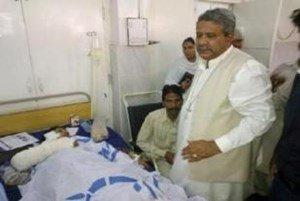“Last year was the worst year of my life. I do not see things getting better in the near future,” says Uzma Insar, a 33-year-old homemaker, who belongs to the Christian community of Peshawar.
Uzma lost her two children on September 22, 2013, when two suicide bombers blew up All Saints Church located inside the Kohati Gate of the old walled city of Peshawar after a Sunday service, killing nearly 100 worshippers.
She tells me that she remembers she tried to convince her nine-year-old daughter, Nehar, who was running a fever that day, and her 11-year-old son Eshan Gohar to miss Sunday school at the church. “They were excited to attend school, as they had done their homework and wanted to show it in the class,” she says. For Uzma time has not moved on, it’s frozen. She vividly recalls every detail of the explosion – the two blasts and then destruction, smoke, painful cries, blood, bodies. “I wish I had not lived to see it at all”, she says quietly.
The explosion had critically injured Uzma. She was kept in the intensive care unit for a week and then in the ward for two months, where her injuries were treated. One year on, Uzma and her community members live under the shadow of the two blasts. She says there is no respite from fear. “I could not weep or smile for two months after the incident. I had to go through psychological counselling for a month to feel anything like normal,” says Uzma’s husband Insar Gohar.
The tragic incident has however enabled him to find what he calls a deeper faith. “We go to church regularly but avoid the All Saints Church. We go to other churches because All Saints Church reminds us of our children,” he says. “But we count it as a privilege that we have been enabled by God’s grace to go through this trial and come out with a stronger faith.”
Insar is part of the religious counselling programme and visits the survivors of the bomb attack at their homes. Many are still dealing not just with the physical but the mental affects of the tragic events.
All of the Christian families that I met in the Kohati area of Peshawar have a heart-wrenching story to tell. According to data collected by the Diocese of Peshawar, the September 2013 attack, left 54 children orphaned, 16 widows, seven widowers. Five people that were critically injured are still recovering and seven others have been significantly disabled.
Several people belonging to the Christian community have already moved from Peshawar to Sri Lanka and Malaysia. “Most of the families who have links or resources have either left the area or are in the process of moving,” says Danish Younis, 35, who was injured in the blast.
Danish goes to the church regularly but feels the place has changed. “We have to go through strict security checks. There are signs of destruction from the blasts on the walls of the church. Every visit to the church reminds me of September 22, 2013. My two children were also with me. They were saved but I saw dozens of children getting killed,” he says, adding, “It is not easy to forget those scenes.”
Although the religious leaders of the community still preach faith and hope, Rev. Joseph John, priest at Diocese of Peshawar says, “the current situation is difficult. Yes, there is hope because ours is the God of hope but the entire Christian community feels insecure after the attack”.
Rev Joseph continued, “There is a danger that the church will lose its identity. It is no more the All Saints Church — but the church that was attacked in September 2013 when nearly 100 people were killed.”
Haroon Sarab Diyal, chairman of All Pakistan Hindu Rights Movement and executive member of Commission for Peace and Minority Rights, says every second non-Muslim Pakistanis (he refuses to use the word minority for them) and even members of some Muslim sects want to leave this country: “Nine members of the Sikh community were killed in Peshawar in the last year. In January, this year, a Hindu temple was attacked,” he said.
The Director of the Human Rights Commission of Pakistan, I.A. Rehman said “Minorities in Pakistan are increasingly feeling insecure since the present government came to power in June last year. He referred to their 2013 annual report saying that the last year was “one of the darkest ” for Christians in Pakistan, with the deadliest ever attack on the community mounted in Peshawar in September.
A year on, and the Christian community in Peshawar is still waiting for justice and fulfillment of promises by the government. “We are still begging for justice,” says Bishop Humphrey Peters, Diocese of Peshawar and Anglican Alliance board member. “But we don’t simply want handouts from people, we want recognition and them to support us to be the church that God has called us to be”
The federal government pledged to fund Rs200 million for an endowment for orphans and widows. “We decided to develop a church house for orphans and widows with the promised amount but it has not been released yet. The struggle for justice and compensation has already become too long,” says Bishop Humphrey.
In the picture: Bishop Humphrey Peters visits the injured in hospital after the bombing last year.

